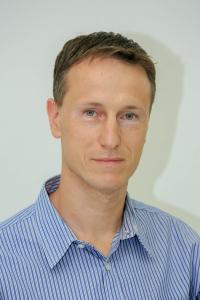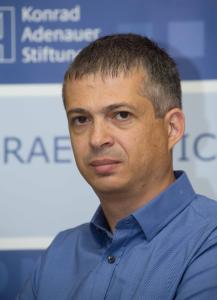1.In the coming year we will mark the 20th anniversary of the Konrad Adenauer Program for Jewish-Arab Cooperation. For the past two decades you have been closely following the developments in the Arab society in Israel. What explains the current outbreak among the Arab citizens of Israel?
Itamar Radai: The immediate reason for the recent events is of course the escalation that took place around the Temple Mount and Al-Aqsa Mosque. Al-Aqsa Mosque is a religious and a national symbol for all the Palestinians wherever they are, including those who are citizens of Israel. The fear that the government may change, or seemingly intend to change the status quo at the Al-Aqsa Compound is considered a "red line" for Israel's Arab population.
Arik Rudnitzky: The intention of the Arab society was therefore to convey a strong message to the government and the Jewish majority, stating that Al-Aqsa is the most sensitive issue for them. In fact, a similar picture was observed during the violent events of October 2000. Then also, the visit of then MK Ariel Sharon to the Temple Mount was understood as a violation of the status quo at Al-Aqsa and sparked riots in the Arab sector, which had been unprecedented in their intensity since the establishment of the state of Israel.
But parallel to the immediate cause of the outbreak, there is a deeper factor: the increasing feeling among the Arab population that the government is not sensitive enough to their needs and feelings. The Arab public feels that the State of Israel has become more "Jewish" and less "democratic" - based on a series of legislative initiatives that were proposed in the Knesset in recent years, seeking to highlight the nature of Israel as a Jewish State: such as the Initiative of Citizenship Law (and pledge of allegiance), the proposal to cancel the equal status of Arabic as Israel’s official language, the "Nakba Law", which prohibits to mark the independence day of Israel as a day of mourning, and so on.
Itamar Radai: These feelings of alienation are particularly evident among the younger generation.
2. Does this outbreak reflect the Arab Minority’s relations with the State of Israel in general or is it just spontaneous solidarity with their Palestinian brothers?
Itamar Radai: The vast majority of the Arab citizens, including young people, want to maintain the coexistence with the Jewish majority. They see themselves as an inseparable part of the State of Israel. In a survey conducted by the Konrad Adenauer Program prior to the last elections, the majority of the respondents rated the civil issues related to equality and integration as their top priority, before finding a political solution to the Palestinian issue. In the recent years, for instance, we have witnessed an increase in the number of Arab medical personnel, and a definite acceleration in the process of “Israelization”, as reflected in the shared public spaces and everyday language, which is increasingly influenced by the Hebrew language. Quite of few Arab citizens in Israel are now bilingual. In the background, however, there still exists a conflict of identities, between the national Palestinian identity and the Israeli civil identity.
Arik Rudnitzky: The leadership of the Arab community, as well as its vast majority, is not at all interested in reaching a confrontation with the authorities or the Jewish majority. Alongside with the spontaneous demonstrations of young Arabs in mixed cities and in several towns and villages in northern and central parts of Israel last week, Arab leaders made sure to avoid any collision with the state authorities. The recent outbreak highlights more religious identity and particularly national solidarity among the Arab citizens in Israel and the Palestinians in the territories.
3. In your estimation, at the end of the day, do the Arab citizens of Israel identify more with the Palestinian cause or with the state in which they live?
Itamar Radai: First of all, it should be of course clear that one cannot generalize. The Arab community in Israel consist of about one million three hundred thousand (not including East Jerusalem Arabs, who in most cases are not citizens). There are different political, social and religious groups, with diverse approaches. The Arab citizens are of Palestinian origin, so that most of them see themselves as Palestinians who have been cut off from the rest of the Palestinian people and became Israeli citizens in 1948.
Arik Rudnitzky: The aspiration of the Palestinians in the West Bank and Gaza Strip to establish an independent state in the territories of '67 is part of the national consensus on the Arab street in Israel. This fact was also reflected in the recent events, when the Arab protesters in Nazareth and other villages in Galilee called last week to respect the right for self-determination of the Palestinians in the territories.
Itamar Radai: However, there is a great desire, even a huge desire, to fit in and be an integral part of the State of Israel, but without giving up personal and collective identity. Many Arabs believe that the two identities - the national Palestinian and civil Israeli - can live together without contradiction. According to this approach, if the State of Israel reaches a peace agreement with the Palestinians, it will make it easier for the Arab citizens of Israel to identify with their state and will help healing the rifts.
Arik Rudnitzky: Alongside to their solidarity with their brothers in the territories, Israeli Arabs emphasize that they are full citizens of the state in which they live. Knesset members and journalists in the Arab society reminded that in comparison with other places in the world with national conflict between majority and minority, the Arabs in Israel are a very peaceful national minority, which obeys the rules of its state.
4. In the last elections of March 2015 the Arab parties united to create a joint list. Are the Arabs united in their opinions these days? Does the Joint List really represent them?
Itamar Radai: One can find a great variety of views, opinions and trends among the Arab citizens: From those who support military service in the Israel Defense Forces, to those who call for a boycott of the Knesset elections and deny the legitimacy of the State of Israel. The vast majority moves, as mentioned, between the national Palestinian identity and the Israeli civil identity, striving for integration and equality. The Joint List was established for the last elections, as a common platform for the main political factions, represented by Hadash, Balad, Taal, and the southern branch of the Islamic Movement. There are large gaps between these parties on political, religious, social and economic issues.
Arik Rudnitzky: The Joint List was a response to the circumstances: The raising of the electoral threshold on the eve of the Knesset elections convinced the representatives of the three major parties, which until then represented the Arab public in the Knesset, to join forces and run on a joint list. But alongside with the pragmatic considerations, was also a more fundamental consideration: the response of the Arab politicians to the “will of the people" - the desire of many in the Arab society to see their representatives transcend the differences between them and unite into one body, in order to confront the Jewish right-wing parties in the Knesset.
A few months after the elections, it seems that the partnership between the different components of the list is holding on despite ideological differences. These differences and varieties actually offer a mirror reflection of the whole Arab society - a heterogeneous society that includes Muslims, Christians and Druze; traditional and modern, religious and secular, people with a liberal worldview next to people with dogmatic views. The Arab society has never been a single bloc, but it knew how to keep unity when it came to collective affairs.
Itamar Radai: From the very beginning the platform of the Joint List emphasized the civil agenda, which requests full integration alongside with the search for a political solution to the Palestinian issue. Accordingly, the Joint List elected as party leader Ayman Odeh, Secretary General of the Hadash party, who stands for Jewish-Arab cooperation. The election results speak for themselves: an impressive increase in voting percentages, and a wide support for the Joint List. It is to assume that were an election held in the near future, the results would be the same.
5.In your view, what will be the impact of the current situation? Are there any expectations among the Arab public for concrete achievements?
Arik Rudnitzky: Unfortunately, it seems that the immediate effect of the recent events will lead to the deepening of the rifts and reciprocal detachment between Jewish and Arab citizens in Israel. Many Israeli Jews do not forget and forgive the solidarity of the Arab public with the Palestinians in the Gaza Strip during last summer's military operation (Operation "Protective Edge"). The solidarity of the Arab citizens back then was expressed in the posts published on Facebook and responses on websites, mainly criticizing the IDF and identifying with the Palestinians in the Gaza Strip. In reaction, Jewish citizens called to deprive the Arab population of their Israeli citizenship. The clashes among Jews and Arabs were basically conducted in the virtual arena. The recent protest actions of the Arab public shifted to riots and even acts of violence targeting Jewish civilians, which were countered by some cases of Jews harming Arabs. The overall result is an increase of mutual suspicion between the two groups.
Itamar Radai: The cases of violence among Arabs and Jews, even if they were only few and quite exceptional, might leave a trace for a long time to come. At the same time, we have heard voices calling for the continuation of peaceful coexistence ("Jews and Arabs refuse to be enemies"), both from Jewish-Arab organizations promoting equality as well as from private citizens who work together in shared public spaces, such as hospitals, for example.
There is a hope that the wish for normalcy and the presence of the Arabs in the Israeli space will heal the wounds faster. The big question, also in the Arab society, is how to prevent further outbreaks.
Arik Rudnitzky: It seems that both sides now seek to return life to its normal course. The main message that the Arab sector intends to convey to the Jewish public is that no matter how strongly the government policies will be criticized by the Arab public, particularly concerning the sensitive issue of the Al-Aqsa Mosque, there is no intention to undermine the character of the state and the balance between its majority and its minority.
Itamar Radai: The immediate expectation of the Arab public is, of course, to assure that the status quo at Al-Aqsa remains the same. In this respect, it appears that the measures taken by the government achieved their goal. In the long run the Arab society, as noted before, seeks better integration in everyday life, while maintaining their national and cultural identity. But these are certainly far-reaching goals that cannot be perceived as concrete achievements following one or the other crisis.




